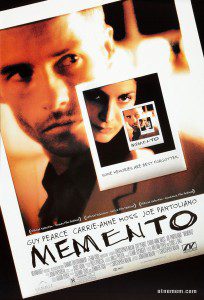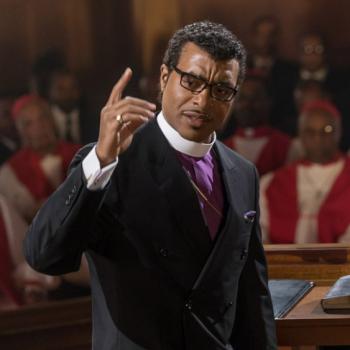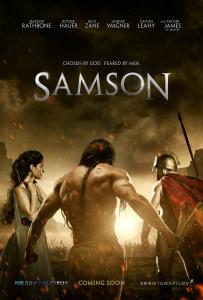 I once watched Memento (2000) with a group and afterwards one of the group members said that he didn’t like the film because the medical condition of the main character is so rare that he couldn’t identify with it, and so he had little sympathy for the protagonist. But, it seems to me that the film is an examination, not so much of a medical condition, but of Leonard’s real condition, the condition of being human and trying to make your way in the world. And that is a something with which we can all identify. Memento seems, on first viewing, to merely be a puzzle that must be put together to make sense of the plot. However, the more you interact with the film, the more you realize that the plot is secondary, and the questions that the film raises are at the center of what the film is really about.
I once watched Memento (2000) with a group and afterwards one of the group members said that he didn’t like the film because the medical condition of the main character is so rare that he couldn’t identify with it, and so he had little sympathy for the protagonist. But, it seems to me that the film is an examination, not so much of a medical condition, but of Leonard’s real condition, the condition of being human and trying to make your way in the world. And that is a something with which we can all identify. Memento seems, on first viewing, to merely be a puzzle that must be put together to make sense of the plot. However, the more you interact with the film, the more you realize that the plot is secondary, and the questions that the film raises are at the center of what the film is really about.
Christopher Nolan’s second film is about Leonard Shelby (Guy Pearce) and his condition, anterograde amnesia, which prevents him from making new memories. He can plan ahead and remember things before the accident that caused his condition, but he cannot recall what he has just done, essentially living life ten minutes at a time. In order to be able to get his bearings every morning (and multiple times throughout the day), Leonard places informational tattoos all over his body and takes Polaroid pictures of people in his life everywhere he goes. The most prominent of his tattoos are two across his chest that say ‘John G raped and murdered my wife’ and ‘Find him and kill him’.
The plot is ostensibly about Leonard’s quest to find and kill his wife’s rapist/killer. However, since Leonard and his ‘friend’ Teddy (Joe Pantoliano) present different accounts of events (and since Nolan has refused in interviews to say what actually did happen), the viewer is left to decide which narrator is more reliable.
Leonard’s condition is an ingenious device to comment on the world. Because Leonard is not able to make new memories, he can only go on old, unreliable memories and on facts that he has accumulated to guide his daily life. What the viewer is presented with is a parable of postmodern Western life: we live in the present, cut off from history, listening to a baffling array of voices, not knowing who to trust. His condition also necessitates that he have ‘a system’ to give his life meaning and to make it bearable. Postmodernism says that, to some degree, we all invent reality, living within our own narratives, failing to fully fit into any meta-narrative.
Memory is a peculiar thing and many films have explored the dynamics surrounding it. Movies like 50 First Dates and Finding Nemo use memory loss for laughs, while films like The Bourne Identity, The Girl on the Train, Anastasia, and Spellbound use amnesia as a dramatic plot device. It’s a rare film, like Away From Her or The Vow, that explores how devastating the loss of memory can be. One of the most interesting movies about memory, and in some ways most like Memento, is Charlie Kaufman’s Eternal Sunshine of the Spotless Mind, where two people (played by Kate Winslet and Jim Carrey) choose to have their memories erased so they don’t have to deal with their feelings about each other, only to meet later and, in the midst of getting to know each other (again), find out about their choice to erase the others’ memory.
The Bible has a lot to say about memory. Interestingly, throughout the book of Genesis, it’s God who is said to remember things- in Genesis 8:1, God ‘remembers’ Noah and in Genesis 30:22, God remembers Rachel. This would seem to contradict our belief in God’s omniscience until you recognize that the biblical writer is using the word ‘remember’ as a way that humans can relate to God beginning to act in someone’s situation.
It’s not until Exodus 13 that the call to remember is given as a command. God commands Israel to remember how He brought them out of Israel by celebrating the Passover. The call to remember then becomes a regular exhortation throughout Scripture.
Every Sunday, we quote Jesus calling us to remember His person and work when we come to the Lord’s Table. The minister says, “This is my body, which is given for you. Do this in remembrance of me.” I used to wonder, why is Jesus so concerned about our memory? I mean, of course, I can remember that Jesus died on the cross for me.
This is where I think biblical language is stronger than our everyday use of that same language. For instance, when the Bible says we need to listen to God’s word, it doesn’t just mean that we need to pay attention, it means that we need to obey, that we need to let God’s word get into our hearts and change us. Similarly, when Jesus says that we are to remember Him, He doesn’t just mean that we recall facts of His existence, rather that we ground our reality in Him. In other words, remembering the work of Christ is less about being able to recall an historical event and more about having it shape how we live and act consistently.
This is where we are like Leonard Shelby. Because we are, as the hymn says, ‘Prone to wander… prone to leave the God I love.’ On the one hand, we know God loves us and that Jesus died to pay the penalty for our sin, but ten minutes after being told that mom is in the hospital or that we didn’t get the promotion, we don’t believe that God loves us or that Jesus is our righteousness. The gospel of free grace is so counter-intuitive that unless we’re constantly reminded that it’s true, our hearts revert to works righteousness, not believing that God loves us unless we earn His love.
Michael Horton puts it so well, “We can never take the gospel for granted. It is always the surprising announcement that fills our sails with faith for an active life of good works… The gospel is so odd, even to us Christians, that we have to get it again and again. That is why God has graciously created different avenues for getting it to us: he proclaims it by the mouth of another in Christ’s name, bathes me in it with water, and puts it in my hand through bread and wine.”
The Lord’s Supper is our tattoo, our Polaroid pictures, reminding us who we are, what our mission is, and who we can trust. It says, ‘Remember that you’re loved more than you can imagine, and more than you deserve.’ It reminds us that we have a family and that we’re not alone.
Interestingly, the movie Memento is based on a short story called Memento Mori, which means “Remember your death” or “Remember that you have to die.” In the film, Leonard has to create meaningful tasks to give order to his life and to keep from losing purpose in life, which is essentially death. So too, the elements of Communion are reminders of death- of a body broken and of a dying man’s shed blood. But, rather than reminding us that life is short and we need to make the most of the little time we have before we die, the elements remind us that death is not the end. Because of Christ’s eternal sacrifice, we have eternal life in Him.
Everyone is prone to spiritual amnesia. That’s why we need spiritual disciplines, and it’s why we need to meet with the Lord at His table regularly, so that we can remember His death and be equipped for our death, and our life in eternity. Memento mori, but also memento amorem– remember the love.













